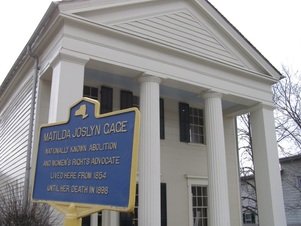 The Matilda Gage House in Fayetteville, NY
The Matilda Gage House in Fayetteville, NY I recently revisited the Matilda Joslyn Gage House in Fayetteville, New York. It was something of a pilgrimage, as I consider her one of my spiritual foremothers. In fact, I took her last name as my own.
The visit brought to mind a quotation by the lesbian poet Adrienne Rich, on the subject of truth. She spoke of it as an “increasing complexity.” Historically, I have preferred my truth monochrome, monothematic—because I find comfort in certitude. It’s a near relation to rectitude, and rectitude purchases indemnity. But I digress.
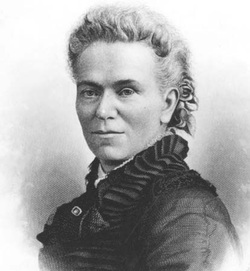 Matilda Joslyn Gage
Matilda Joslyn Gage This was why I had chosen to be her namesake, actually: Because Gage had refused to compromise her principles in the name of expediency. She would not compromise in her opposition to a “white-women-only” Suffrage campaign, nor would she compromise on her opposition to the Church. In fact, she had written an entire book, Woman, Church and State, unmasking the misogyny of Christian history, supporting her thesis that the exploitation of women was not some oversight or side effect of Christianity, but was it’s entire raison d’être. In other words, Christianity could not be redeemed.
I loved Gage’s radical vision. I loved her refusal to compromise, even when it cost her so dearly.
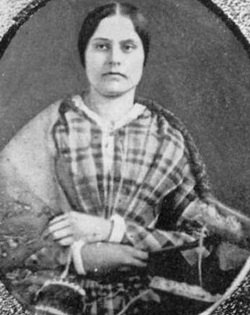 Susan B. Anthony, Lesbian
Susan B. Anthony, Lesbian My history, since coming out, had been that of a low-income, single lesbian who supported herself largely through touring around the country and giving lectures and performances. Standing in the Gage House, I realized with a jolt that my life experience had more in common with that of Susan B. Anthony—a single, working-class lesbian who supported herself with public speaking—than with Matilda Gage.
And this realization caused me to revisit that historic betrayal of 1890.
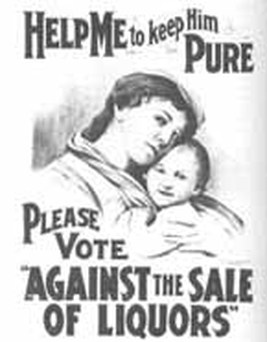 Temperance Poster
Temperance Poster Anthony’s roots were in this movement of survivors. The personal stories of suffering that she encountered would be familiar to any rape crisis or shelter worker. The needs were immediate: shelter, food, protection, medical attention, social services for the children.
Anthony had moved away from the temperance movement to the movement for Suffrage, but those roots and those experiences continued to inform her activism. Standing in the Gage House, which is in a lovely middle-class neighbhood of large houses with landscaped yards, I began to experience the increasing complexity of that so-called betrayal.
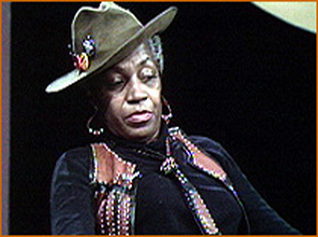 The Inimitable Flo Kennedy
The Inimitable Flo Kennedy I remembered the words of Florynce Kennedy: “'Nothing but the best for the oppressed' translates to ‘nothing for the oppressed.’” And I remembered the words of another legendary activist, Bernice Reagon Johnson: “If you’re in a coalition and you’re comfortable, you know it’s not a broad enough coalition.”
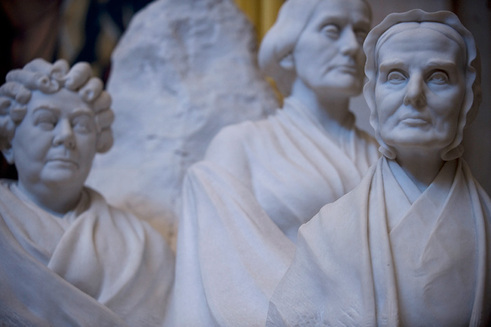 Suffrage Monument honoring Stanton, Anthony and Mott. Missing: Sojourner Truth and Matilda Gage
Suffrage Monument honoring Stanton, Anthony and Mott. Missing: Sojourner Truth and Matilda Gage Was it Gage who betrayed Anthony in her refusal to compromise, holding their Suffrage organization hostage to a radical vision that was so far ahead of its time? It was easy for Gage to explore spiritualism and other metaphysical systems, when she was not dependent upon the Church as a support system that could provide community, emergency health care, and financial relief, as well as ideological support for the purity and sanctity of womanhood--a lifeline to women struggling with the contempt and violence of their spouses. How relevant would the historical violations of the Church be to these women who had nowhere to turn but the Church? Was it realistic to expect them to catch up to doctrines of radical feminism in their lifetimes?
I left the Gage House overwhelmed. It was difficult to resist the temptation to think I had been wrong. Right and wrong have no place in “increasing complexity.” The world has need of radical and visionary thinkers, as well as for the pragmatic, on-the-ground, coalition-building, compromise-making activists. There will always be a tension between the two positions, and that tension can provide a healthy check against the excesses to which each is liable.
The Gage House stood as a bulwark of rectitude for me in my younger days, when I was in the process of reinventing myself. Today my appreciation of it has increased in complexity. Today it is an invitation to go deeper, to challenge everything--even to examine my beloved foremother through the lens of working-class, lesbian activism.
Take a tour of the Matilda Gage House website. This essay, narrowly focused on a specific facet from my own experience, does not in any way do justice to this remarkable woman, who did "walk her talk" in so many radical ways. Her home was on the Underground Railroad, and, because of her coalition work with Native women in her area, she was adopted into the Wolf Clan of the Mohawk Nation. Her son-in-law, L. Frank Baum, would author the beloved Oz books, with their gender-bending heroines. Her crusade for separation of Church and State is especially relevant today. Sally Roesch Wagner is the visionary and pragmatic Executive Director of the Gage Foundation, and, I am privileged to say, a friend and colleague.

 RSS Feed
RSS Feed
